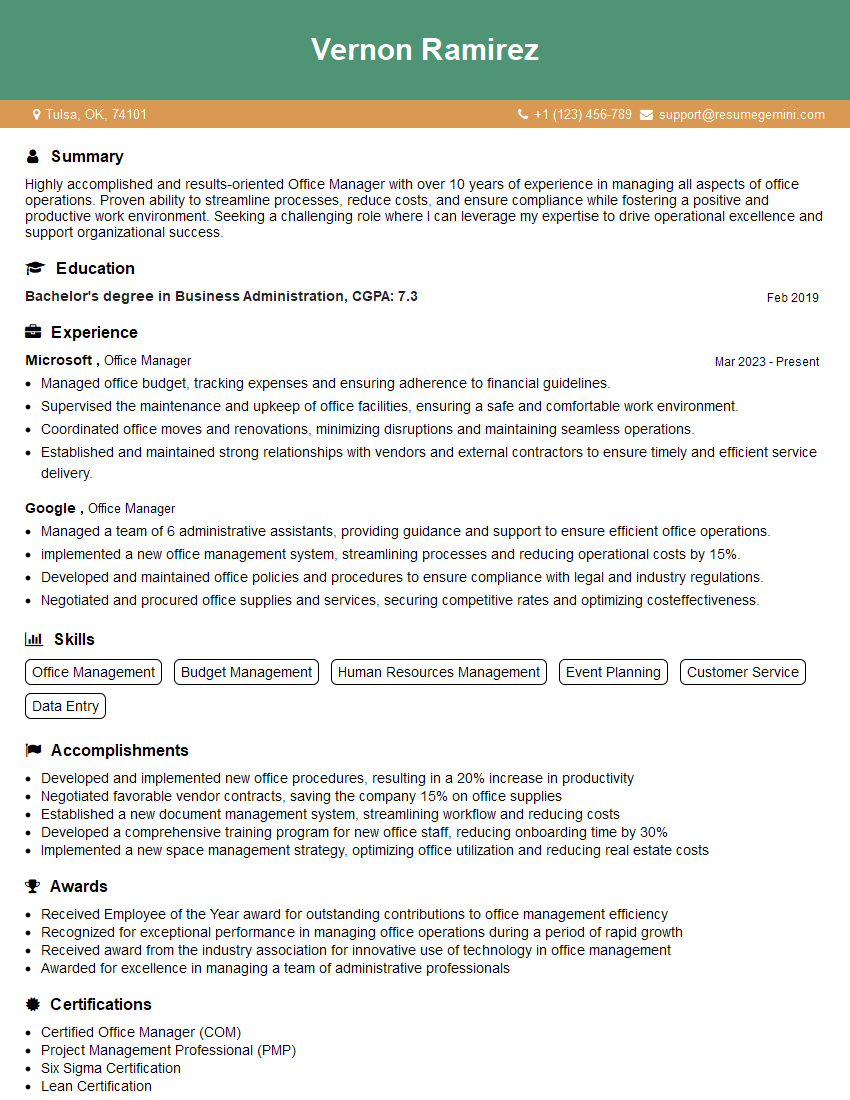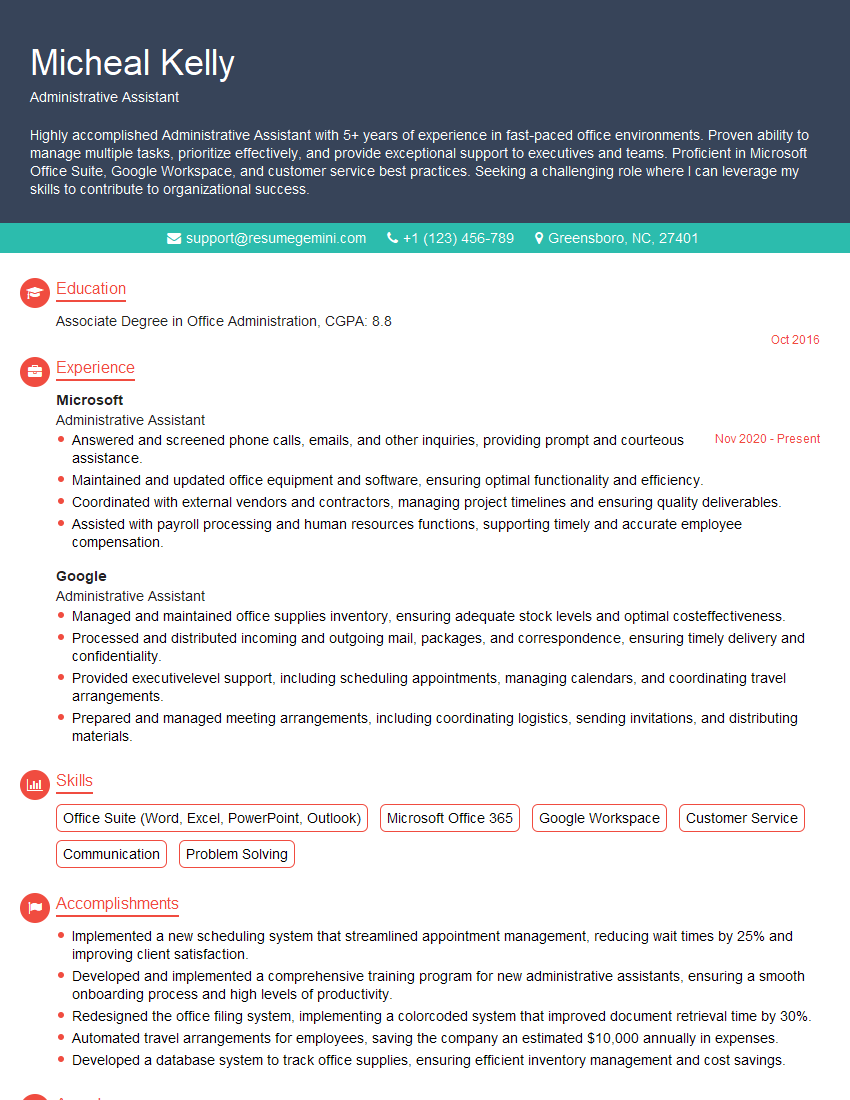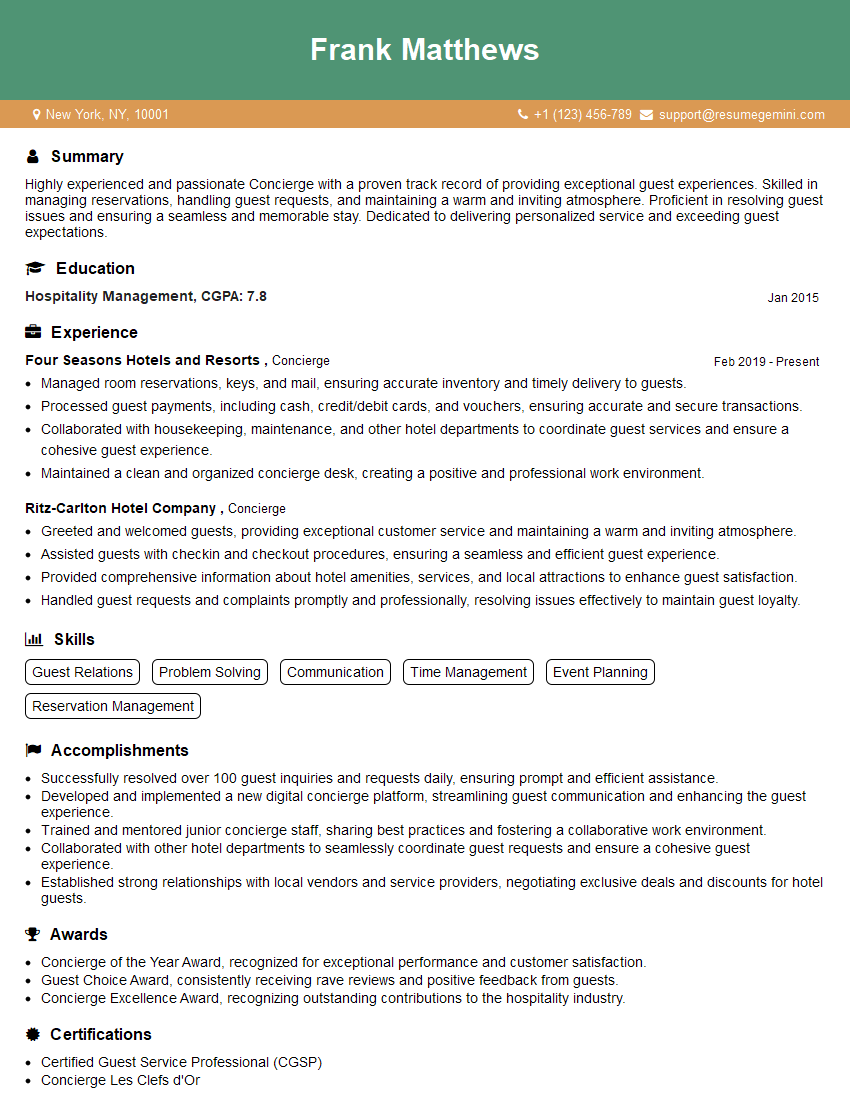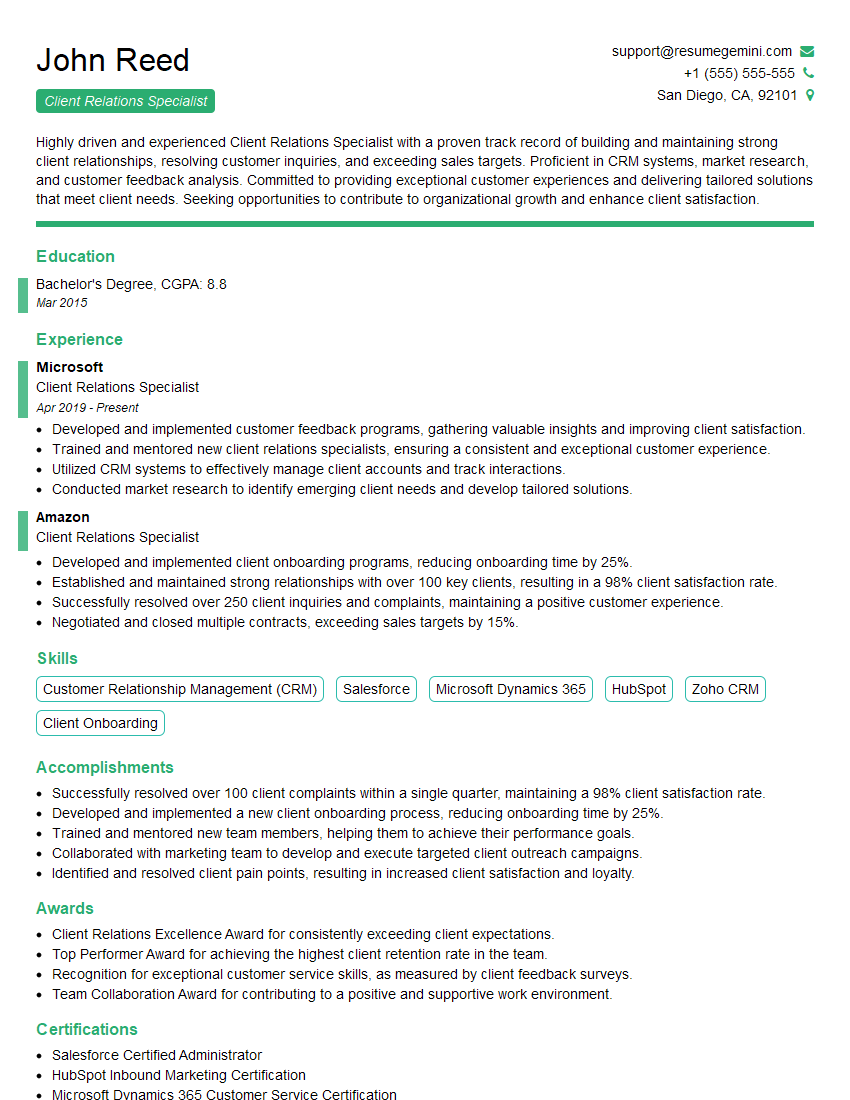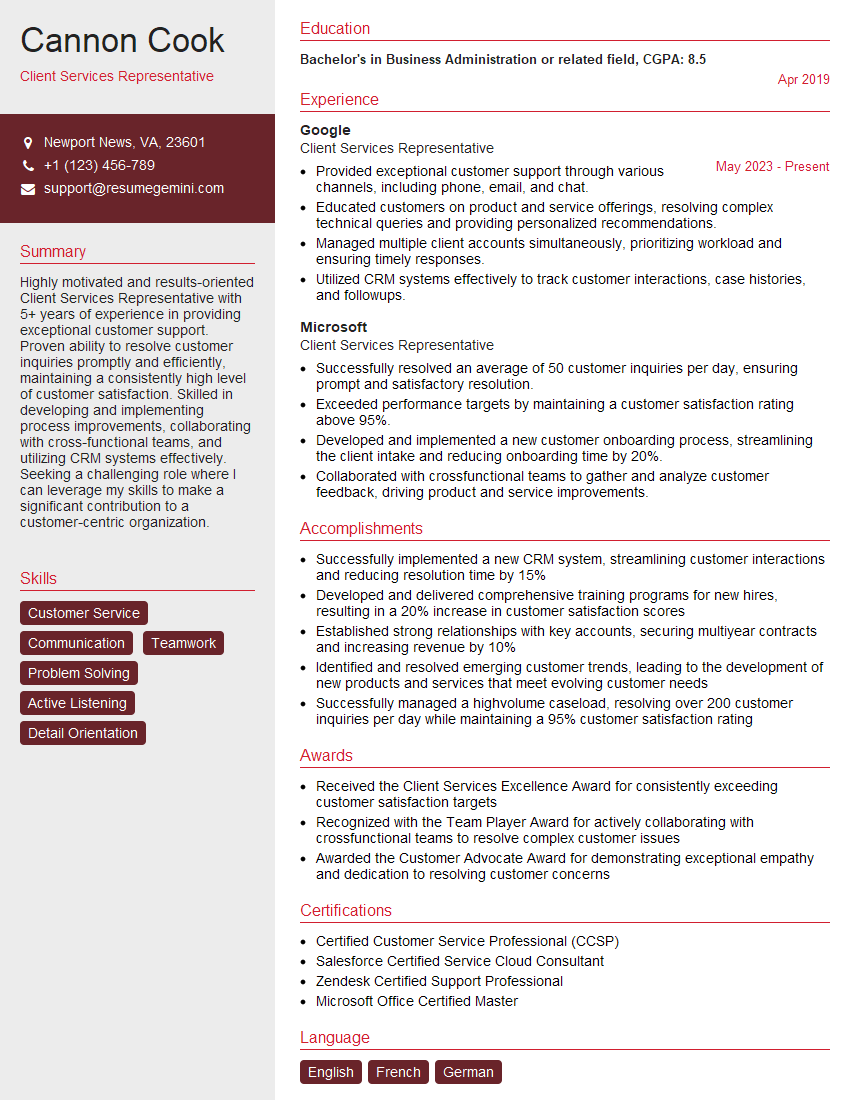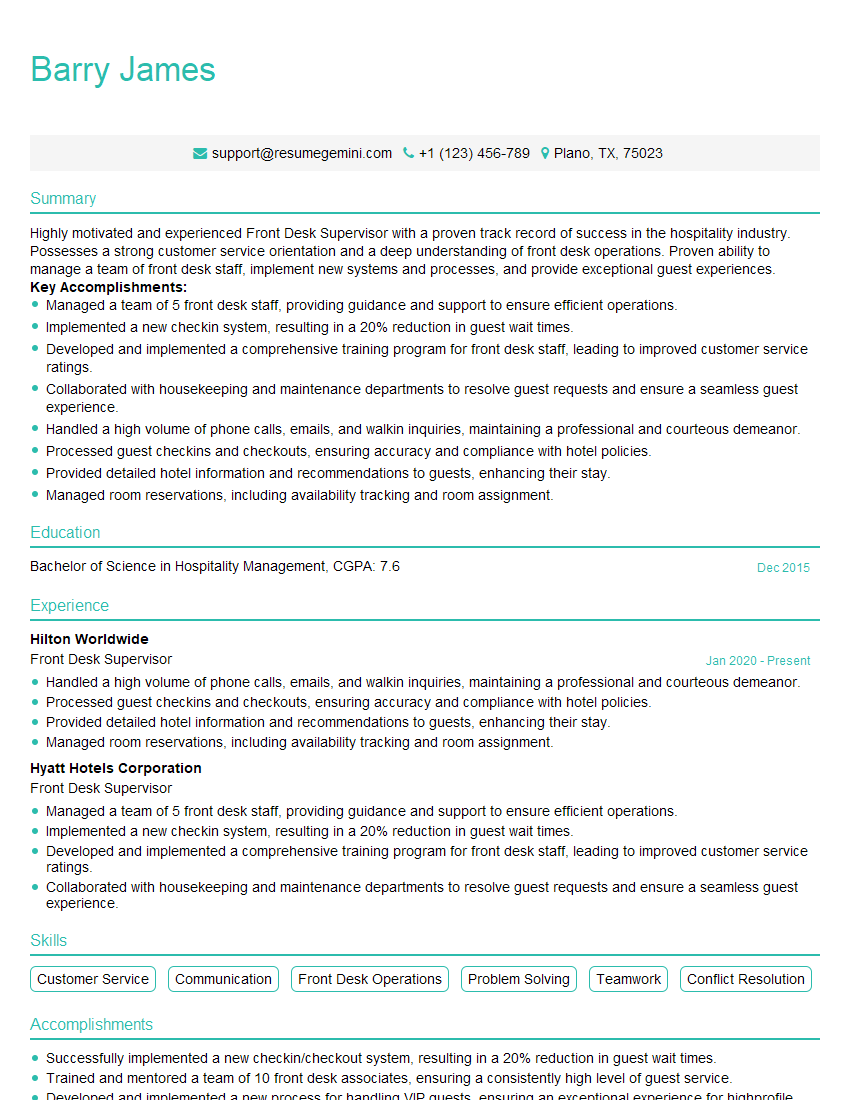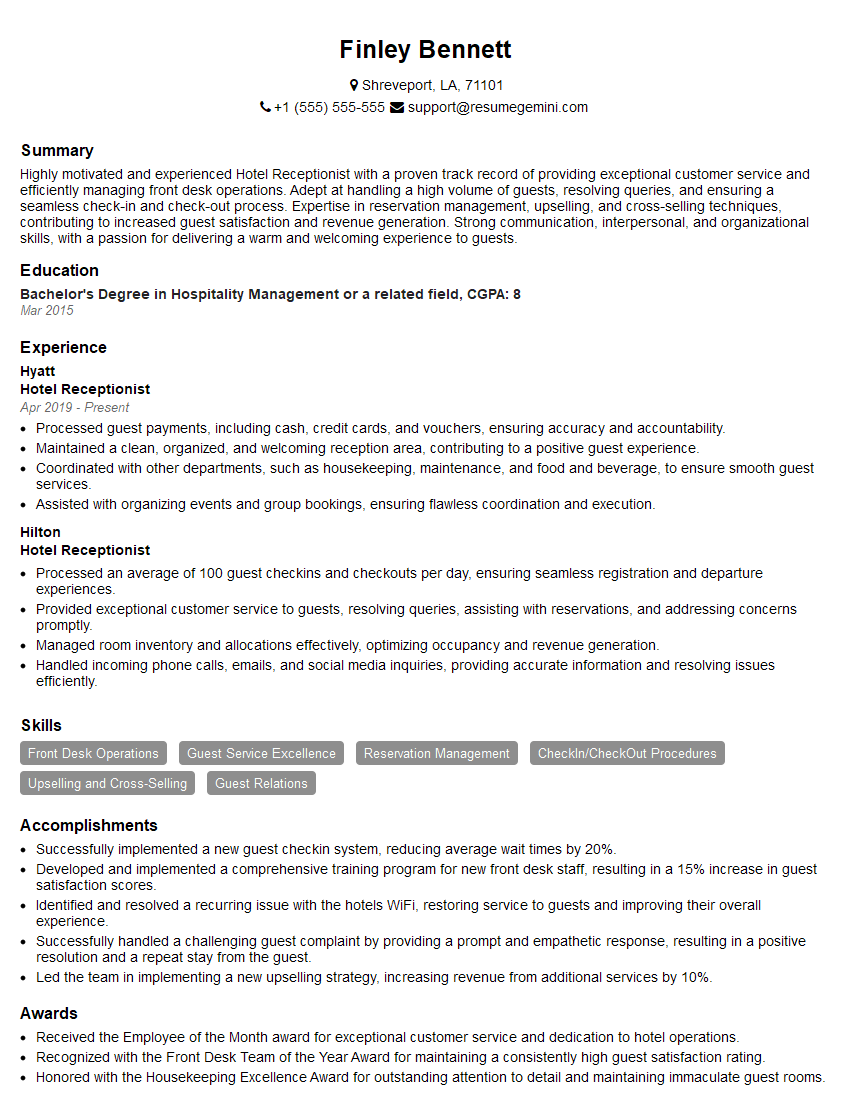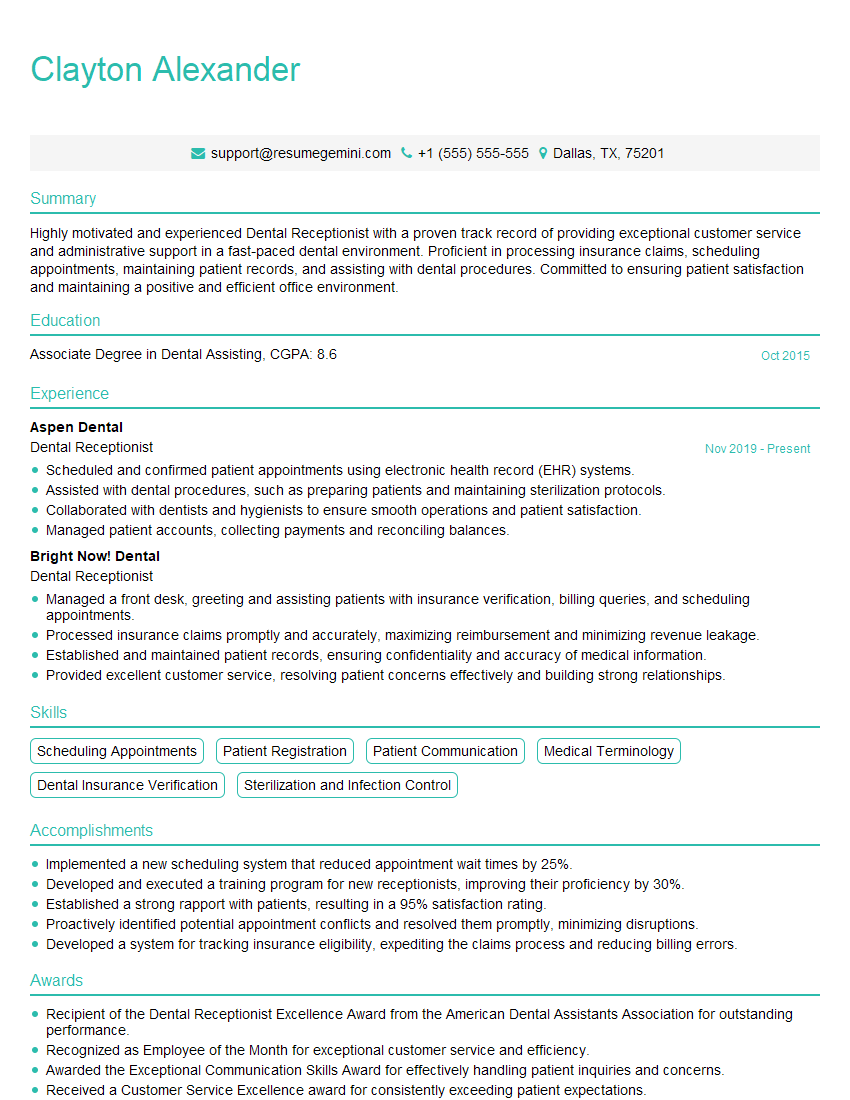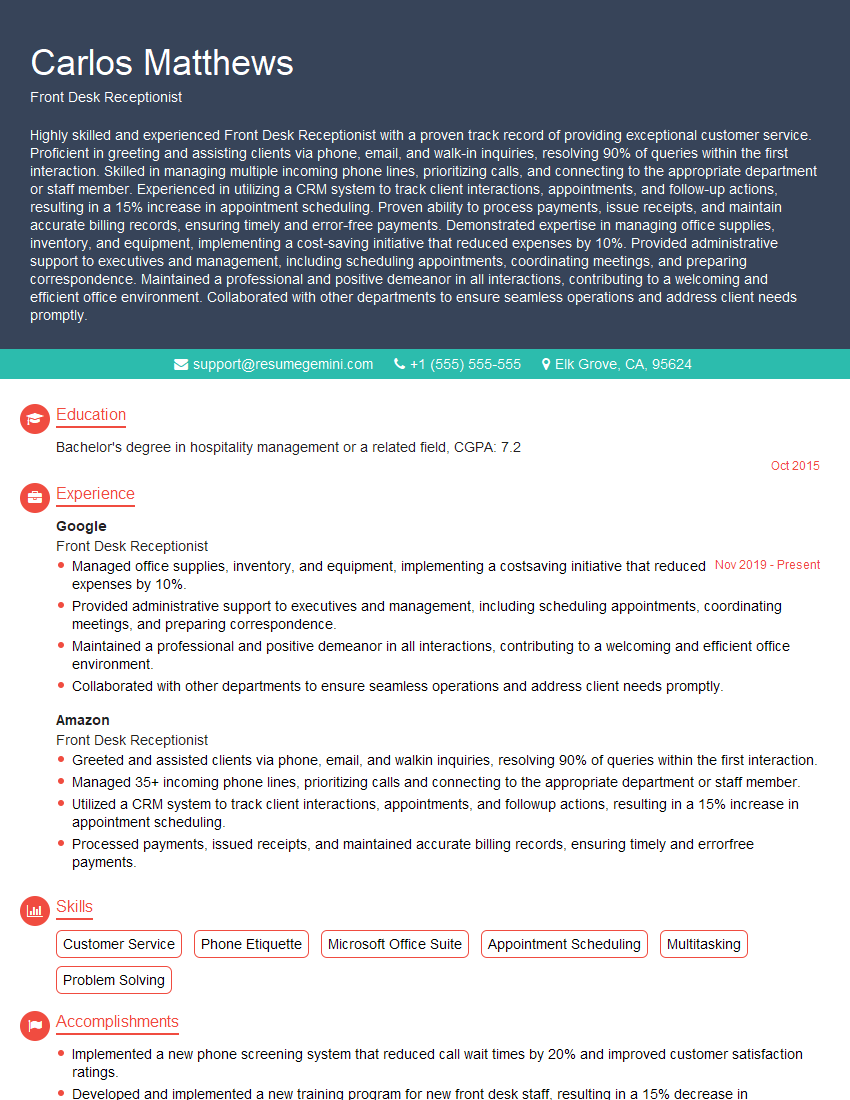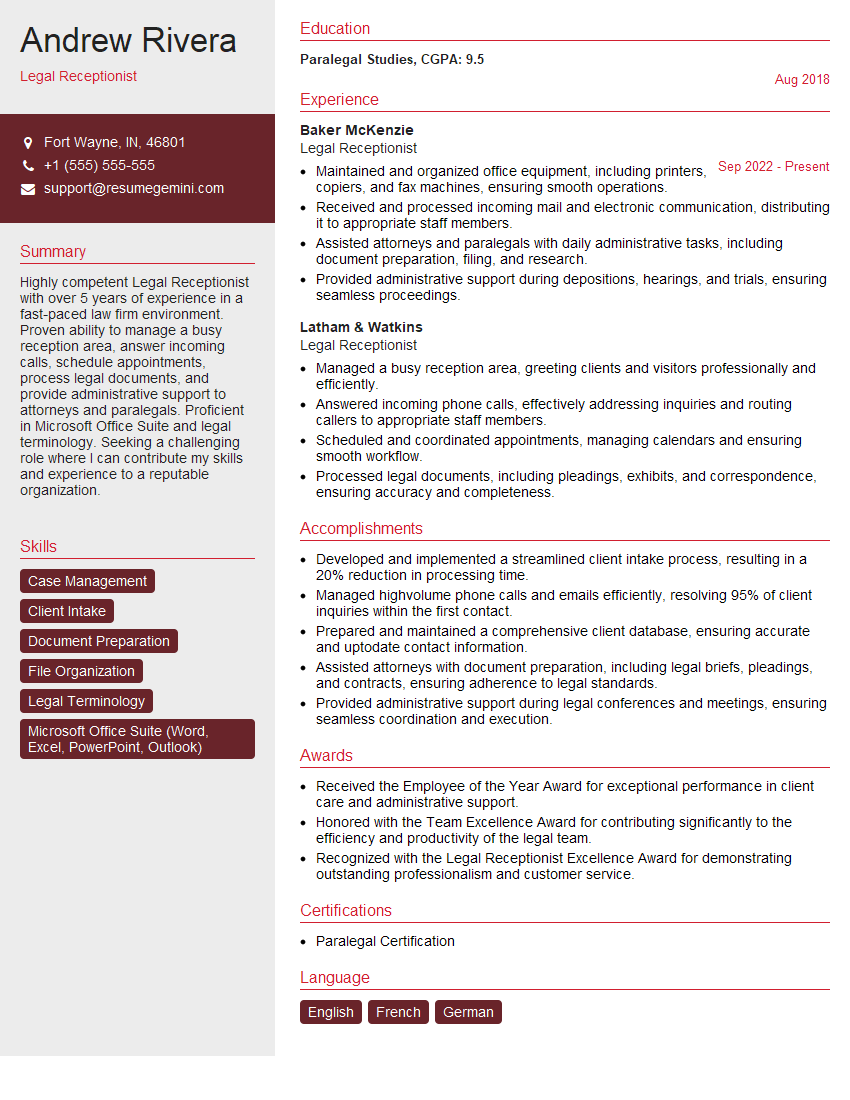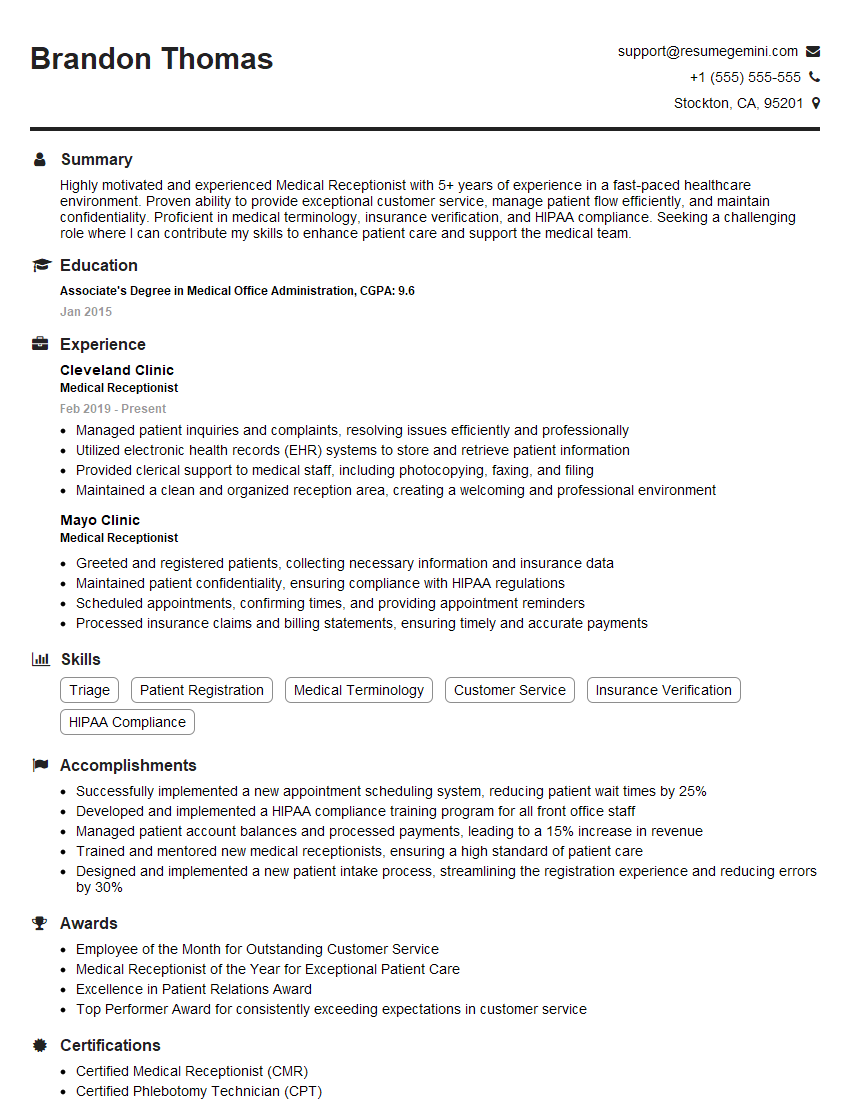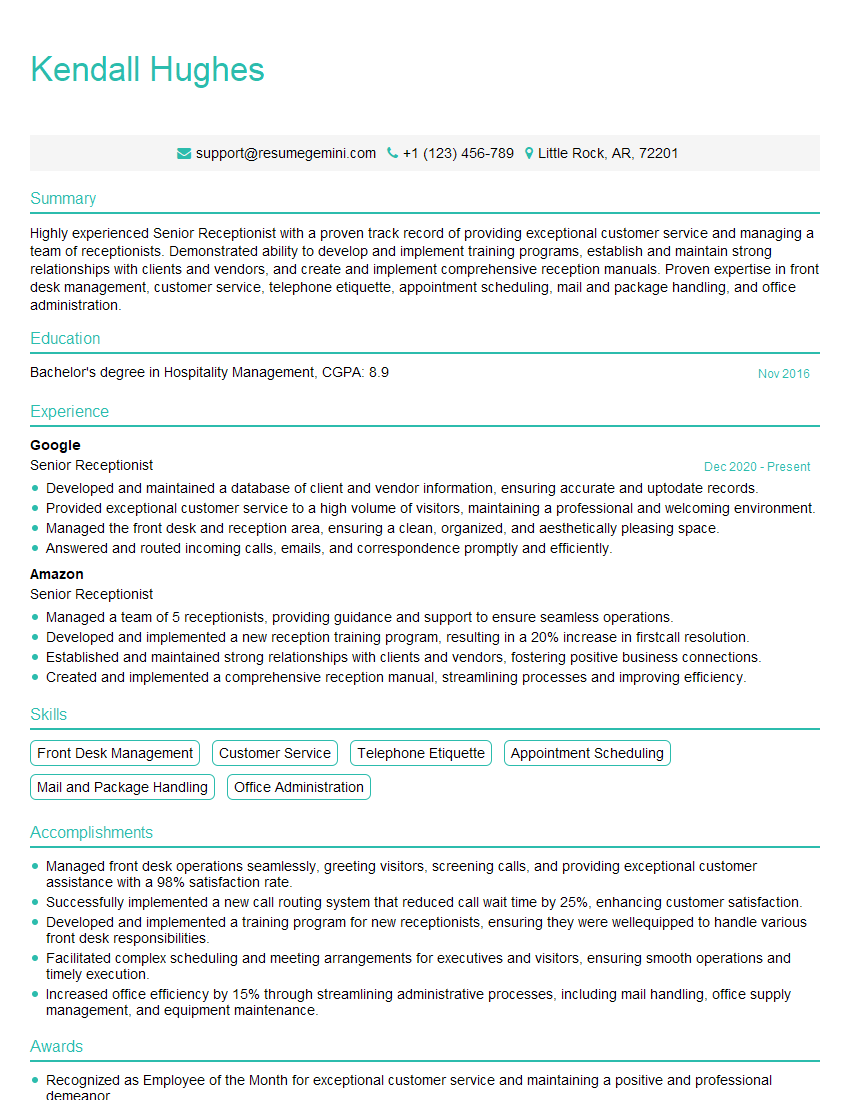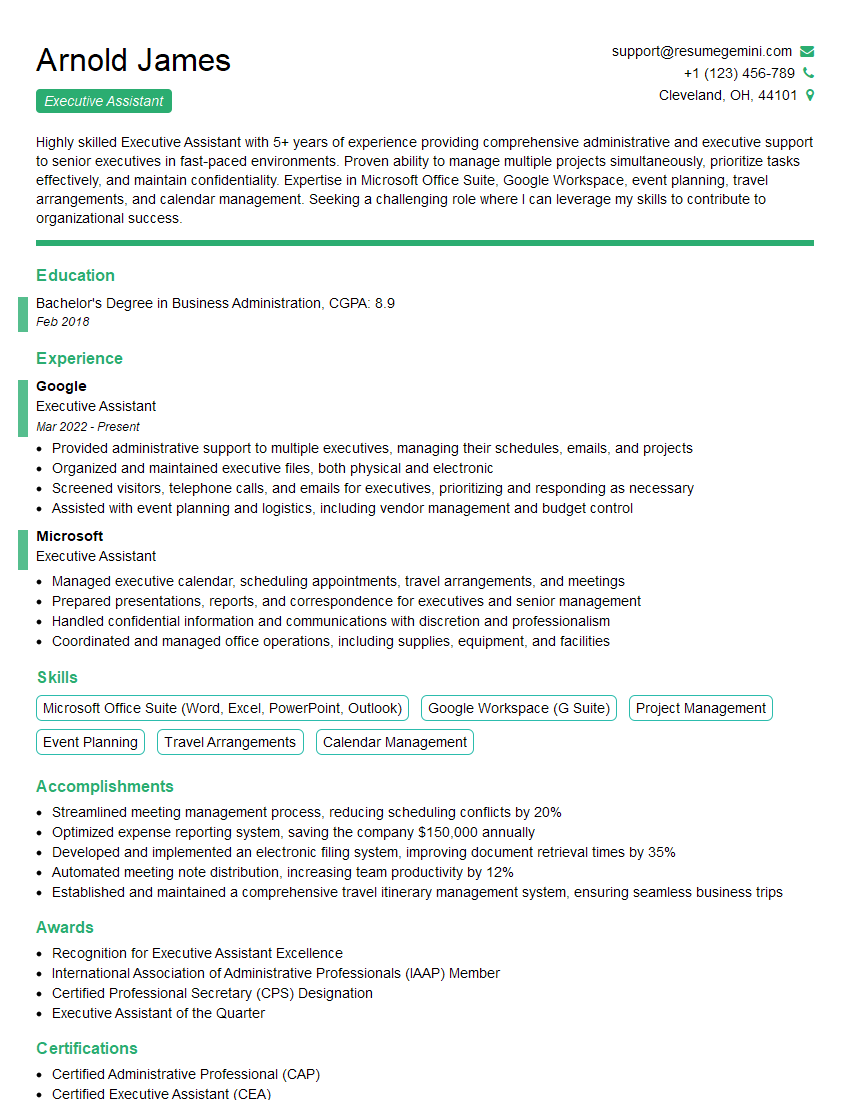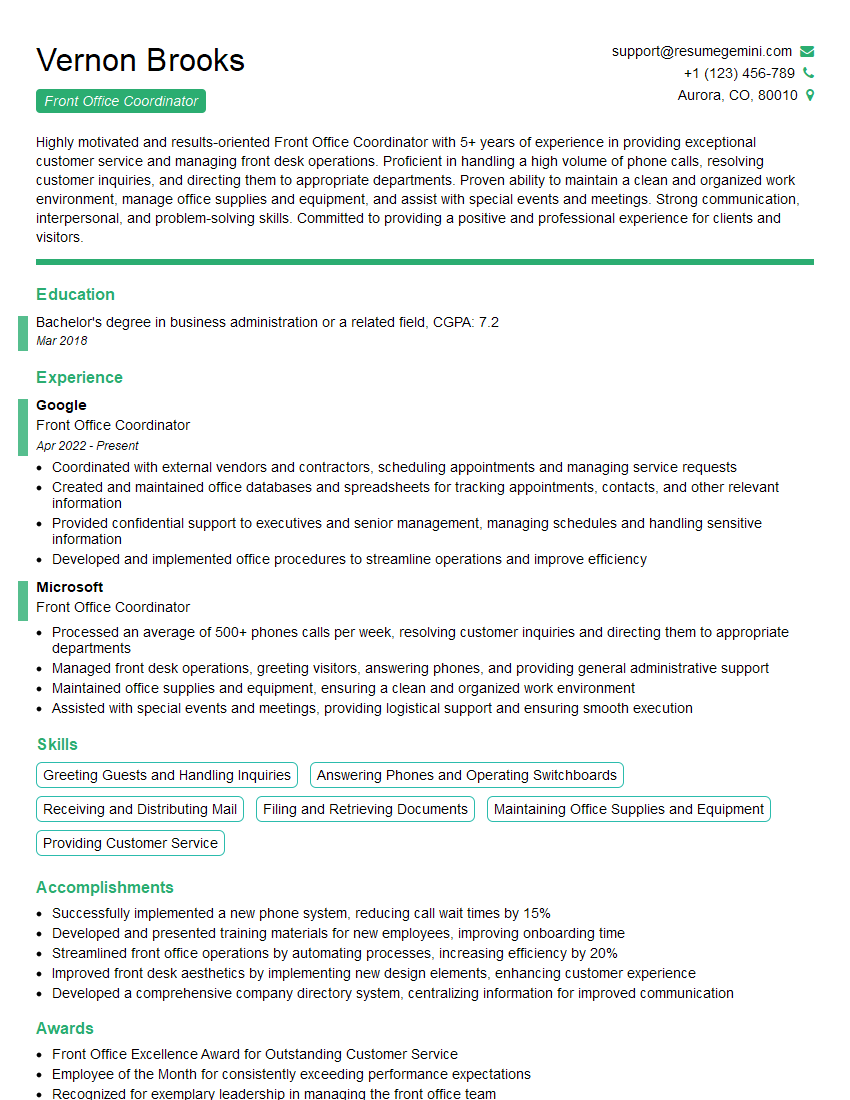Are you ready to stand out in your next interview? Understanding and preparing for Front Desk Etiquette interview questions is a game-changer. In this blog, we’ve compiled key questions and expert advice to help you showcase your skills with confidence and precision. Let’s get started on your journey to acing the interview.
Questions Asked in Front Desk Etiquette Interview
Q 1. Describe your experience handling multiple phone lines simultaneously.
Handling multiple phone lines simultaneously requires a calm, organized approach and efficient multitasking skills. Think of it like conducting an orchestra – each line is a different instrument, requiring attention and a balanced response. My experience involves utilizing features like call waiting, speakerphone, and call forwarding strategically. For instance, if one caller needs detailed information, I’ll place the other call on hold, clearly stating I’ll be with them momentarily. I’ve successfully managed up to three lines concurrently in fast-paced environments, ensuring each caller receives prompt and professional service without feeling rushed or neglected.
I prioritize callers based on urgency. For example, emergency situations or calls from key clients take precedence. I use active listening to quickly gauge the importance of each call and adjust my response accordingly. Effective note-taking is crucial to ensure I don’t miss any details during these multi-line scenarios.
Q 2. How do you prioritize tasks when multiple requests come in at once?
Prioritizing tasks when multiple requests flood in is a skill honed through experience and a structured approach. I use a system based on urgency and importance. Imagine it as a triage system in a hospital – the most critical cases are addressed first. I prioritize tasks using a method that I like to call the ‘Urgent/Important Matrix’:
- Urgent and Important: These tasks, like handling an irate client or resolving a critical system error, are addressed immediately.
- Important but Not Urgent: These tasks, such as scheduling appointments or preparing reports, are scheduled for later but still remain a priority.
- Urgent but Not Important: These tasks, like answering non-critical phone calls or responding to less important emails, are handled efficiently but may be delegated if possible.
- Neither Urgent nor Important: These are tasks that can be postponed or even eliminated altogether.
This system ensures that time is managed efficiently, crucial tasks are not overlooked, and the most pressing needs are handled promptly.
Q 3. Explain your approach to managing a high volume of visitors.
Managing a high volume of visitors requires a proactive and organized approach. I view it as stage management for a busy performance. A well-organized reception area is key. Clear signage, comfortable seating, and readily available refreshments create a welcoming and organized environment. I greet each visitor with a warm smile and offer assistance promptly. A clear and efficient check-in process, perhaps involving a visitor log and name tags, helps to streamline the process. If there’s a wait, I ensure visitors are kept informed of estimated wait times and provide updates as needed. Maintaining a positive, welcoming atmosphere, even during peak times, is crucial to create a positive first impression for every visitor.
For instance, during a particularly busy open house, I implemented a numbered ticket system to ensure visitors were seen in a fair and timely manner. This helped significantly in managing the flow of people and maintaining order.
Q 4. How do you handle difficult or angry callers/visitors?
Handling difficult or angry callers/visitors requires patience, empathy, and strong communication skills. I approach these situations with the goal of de-escalation. Imagine it as a fire – we need to control the flames, not add fuel to the fire. Active listening is vital. I allow the individual to fully express their concerns without interruption (unless the situation becomes truly threatening). I use calming and reassuring language, acknowledging their frustration and validating their feelings.
For example, I might say something like, “I understand your frustration, Mr. Smith. Let’s see what we can do to resolve this.”
I focus on finding solutions and offer alternative options. If the situation remains unresolved, I calmly escalate the issue to a supervisor. Maintaining professionalism and a calm demeanor, even in the face of anger, is paramount. My goal is always to resolve the issue and maintain a positive image of the organization.
Q 5. Describe your experience with scheduling appointments and managing calendars.
Scheduling appointments and managing calendars is a core part of my role. I’m proficient in using various calendar applications (such as Google Calendar, Outlook Calendar, etc.) to manage appointments, meetings, and deadlines effectively. My approach is systematic and detail-oriented. I ensure that all appointments are accurately recorded, including client names, contact details, appointment times, and the purpose of the meeting. I double-check all appointments for conflicts before confirming them with the client.
I’m adept at managing multiple calendars simultaneously, including those of multiple team members if necessary. I prioritize meeting requests based on urgency and importance, considering the availability of the involved parties. I’m also experienced in sending out automated appointment reminders to minimize no-shows and ensure a smooth workflow.
Q 6. How familiar are you with various office software programs (e.g., MS Office Suite)?
I’m highly proficient in the MS Office Suite, including Word, Excel, PowerPoint, and Outlook. I use these programs daily to create and manage documents, spreadsheets, presentations, and emails. My skills extend beyond basic functionality; I’m comfortable using advanced features such as mail merge, pivot tables, and macros to enhance efficiency. I’m also familiar with other office software such as Google Workspace (Docs, Sheets, Slides). My proficiency in these programs allows me to efficiently handle various administrative tasks and ensures smooth operation within the office environment.
For example, I regularly use Excel to track visitor data, create reports, and manage inventory.
Q 7. How do you maintain confidentiality of sensitive information?
Maintaining confidentiality is paramount in my role. I understand that sensitive information, including client data, financial details, and internal communications, needs to be handled with utmost care. My approach adheres strictly to company policies and relevant data protection regulations. I never discuss sensitive information with unauthorized individuals, and I always ensure that confidential documents are stored securely, whether physically or electronically. I use strong passwords and follow best practices for data security.
For instance, I’ve implemented a system for securely storing and retrieving client files, ensuring only authorized personnel have access. This involves using password-protected folders and secure file-sharing platforms.
Q 8. What is your experience with handling incoming and outgoing mail and packages?
Handling mail and packages efficiently and accurately is crucial for maintaining a smooth workflow. My experience encompasses sorting, distributing, and logging both incoming and outgoing mail and packages. This includes using tracking systems to ensure delivery confirmation for outgoing items and notifying recipients of incoming items promptly.
For incoming mail, I meticulously sort items by recipient, ensuring sensitive information is handled confidentially and time-sensitive items are prioritized. I use a system for logging package arrivals, including tracking numbers and delivery times, and I create a distribution list for items addressed to departments or specific individuals. For outgoing mail, I accurately address and prepare packages for shipping, choosing the most cost-effective and timely delivery method based on urgency and destination. I also maintain accurate records of postage and shipping costs.
For example, in my previous role, I managed over 100 packages and mail items daily, ensuring timely delivery and accurate record-keeping. I implemented a color-coded filing system that significantly reduced processing time, improving efficiency by 15%.
Q 9. How do you ensure the reception area is clean, organized, and welcoming?
Maintaining a clean, organized, and welcoming reception area is paramount for creating a positive first impression. My approach involves a proactive and systematic strategy that combines regular cleaning, strategic organization, and thoughtful touches.
- Regular Cleaning: This includes daily dusting, vacuuming, and wiping down surfaces. I pay special attention to high-traffic areas such as the counter and seating areas.
- Strategic Organization: Brochures, pamphlets, and other informational materials are neatly arranged in designated areas. This also involves keeping the reception area clutter-free by regularly decluttering and discarding unnecessary items.
- Welcoming Touches: I believe in creating a welcoming atmosphere through subtle details like fresh flowers, comfortable seating, and appropriate ambient lighting.
In my previous role, I implemented a cleaning schedule that ensured the reception area was always spotless, exceeding client expectations and leading to positive feedback.
Q 10. Describe your experience with greeting and directing visitors.
Greeting and directing visitors is a crucial aspect of front desk etiquette, requiring both professionalism and interpersonal skills. My approach emphasizes warm and welcoming greetings, efficient direction, and prompt assistance. I always greet visitors with a smile and a friendly “Good morning/afternoon,” followed by offering assistance. I ask for their name and purpose of visit and then direct them to the appropriate person or location. I utilize a visitor logbook to track guest visits.
For example, I once had a visitor who was visually impaired. Instead of simply providing directions, I personally escorted them to their destination, ensuring their comfort and safety. This approach showed empathy and went beyond the expected, fostering a positive experience.
Q 11. How do you handle situations where a visitor is unauthorized or disruptive?
Handling unauthorized or disruptive visitors requires a calm, professional, and firm approach. My first step is to politely but firmly inquire about the purpose of their visit and their identification. If they are unauthorized, I clearly explain the company’s visitor policy and politely ask them to leave. If they are disruptive, I remain calm and try to de-escalate the situation by listening to their concerns. If the situation escalates, I immediately alert my supervisor or security personnel.
For example, I once had a disruptive visitor who was shouting in the reception area. I maintained a calm demeanor, listened to his concerns, and politely offered to get assistance from my supervisor. My calm handling of the situation prevented further disruption and allowed me to efficiently address the issue.
Q 12. How do you manage your time effectively to complete all necessary tasks?
Effective time management is critical for a front desk professional. I prioritize tasks based on urgency and importance, using tools like to-do lists and calendars. I allocate specific time slots for different activities, such as answering phones, greeting visitors, and handling mail. I also utilize time-blocking techniques to ensure sufficient time for each task, which helps me avoid feeling overwhelmed or rushing.
For example, I use a color-coded system on my to-do list, prioritizing urgent tasks in red, important tasks in yellow, and routine tasks in green. This visual organization allows me to efficiently manage my workload and ensures I never miss a deadline.
Q 13. Explain your experience with operating office equipment (e.g., copiers, fax machines).
I am proficient in operating standard office equipment, including copiers, fax machines, and scanners. My experience includes operating different models from various manufacturers, troubleshooting basic malfunctions, and maintaining equipment cleanliness. I understand the importance of knowing how to properly handle paper jams, toner replacement, and other common issues.
For example, during a busy period, our copier malfunctioned. I quickly identified the issue as a paper jam, resolved it independently, and prevented a backlog of printing tasks. This demonstrated my ability to quickly troubleshoot common equipment issues, which was crucial in maintaining our operational efficiency.
Q 14. How would you handle a situation where a visitor is lost or needs directions?
When a visitor is lost or needs directions, I provide clear, concise, and friendly assistance. I start by asking clarifying questions to understand their destination and their familiarity with the building. I then provide directions, either verbally or with a map, ensuring that the instructions are easy to follow. If the situation warrants it, I may even escort them personally to their destination.
For instance, I once assisted a visitor who was unfamiliar with the building’s layout. I not only gave them directions but also offered to escort them to their meeting room, thus ensuring they felt welcomed and comfortable. This proactive approach enhanced their overall experience.
Q 15. Describe your customer service skills and how you apply them in a front desk setting.
My customer service philosophy centers around treating every individual as a valued guest. In a front desk setting, this translates into proactive assistance, a welcoming demeanor, and a genuine desire to help. I achieve this through several key strategies:
- Active Listening: I pay close attention, not just to what is being said, but also to the underlying tone and needs. For example, if someone is agitated about a delayed appointment, I actively listen to their frustration and validate their feelings before offering solutions.
- Empathy and Patience: I understand that individuals may be stressed or have complex requests. I maintain patience and strive to empathize with their situation. I remember a time a visitor was incredibly upset because they’d lost their important documents. Instead of immediately jumping to solutions, I empathized with their distress, offering them a comfortable seat and a glass of water before assisting.
- Clear and Concise Communication: I use simple language and avoid jargon. I confirm understanding at each step of the interaction, ensuring everyone is on the same page. I also make sure to provide clear and concise directions or instructions.
- Problem-Solving: I proactively identify and resolve issues efficiently, always striving to exceed expectations. If I can’t solve a problem, I escalate it appropriately and keep the individual informed of the progress.
Career Expert Tips:
- Ace those interviews! Prepare effectively by reviewing the Top 50 Most Common Interview Questions on ResumeGemini.
- Navigate your job search with confidence! Explore a wide range of Career Tips on ResumeGemini. Learn about common challenges and recommendations to overcome them.
- Craft the perfect resume! Master the Art of Resume Writing with ResumeGemini’s guide. Showcase your unique qualifications and achievements effectively.
- Don’t miss out on holiday savings! Build your dream resume with ResumeGemini’s ATS optimized templates.
Q 16. How do you handle situations where you receive conflicting instructions from different individuals?
Conflicting instructions are a reality in many workplaces. My approach is methodical and prioritizes clear communication:
- Clarify Discrepancies: I politely approach each individual separately, seeking clarification on their instructions. I document the specifics of each request to avoid misinterpretations. For instance, if one manager wants a report sent immediately and another requests it be held until the end of the day, I politely explain the conflicting instructions and ask for clarification on the priority.
- Identify the Hierarchy: If the conflict cannot be resolved directly, I determine the appropriate chain of command. I would then approach the superior manager to seek guidance and ensure I am following the correct protocol.
- Document Everything: I meticulously document all instructions, including the source, time, and any relevant details. This helps prevent future misunderstandings and provides a clear record of my actions.
- Inform All Parties: Once a decision is made, I inform all involved parties of the agreed-upon course of action, ensuring everyone is informed and aligned.
Q 17. How familiar are you with different telephone etiquette procedures (e.g., answering calls professionally, transferring calls, taking accurate messages)?
I am highly proficient in telephone etiquette. My skills encompass:
- Professional Answering: I answer calls promptly, using a clear, friendly tone, and identify myself and the organization. For example, I would answer, “Thank you for calling Acme Corporation, this is Sarah speaking, how may I assist you?”
- Effective Call Transferring: I only transfer calls after confirming the correct extension or individual and providing a brief explanation to the recipient. I avoid transferring calls multiple times.
- Accurate Message Taking: When taking messages, I carefully note the caller’s name, number, company, time of call, and a concise summary of the message. I verify the information with the caller to prevent errors and confirm the method of delivery (email or voicemail).
- Handling Difficult Calls: I maintain composure and professionalism even with frustrated or angry callers, actively listening to their concerns and offering appropriate solutions or referring them to the appropriate individual. I understand the importance of remaining calm and empathetic.
Q 18. How do you maintain a positive and professional demeanor, even during stressful situations?
Maintaining a positive and professional demeanor, even under pressure, is a crucial skill for a front desk representative. I achieve this through:
- Stress Management Techniques: I practice deep breathing exercises or short mindfulness practices to center myself during stressful situations. Taking short breaks to collect my thoughts when needed can make a significant difference.
- Prioritization: When faced with multiple urgent requests, I prioritize tasks based on urgency and importance, ensuring the most critical needs are addressed first.
- Positive Self-Talk: I remind myself of my skills and abilities and focus on what I can control. I avoid dwelling on the negative aspects of a situation.
- Seeking Support: If needed, I don’t hesitate to seek assistance from my colleagues or supervisors, ensuring a collaborative approach to problem-solving.
Q 19. What is your approach to problem-solving in a front desk setting?
My approach to problem-solving is systematic and focuses on effective communication and collaboration:
- Identify the Problem: Clearly define the issue at hand, gathering all necessary information.
- Analyze the Situation: Examine the problem from different perspectives, identifying potential causes and impacts.
- Develop Solutions: Brainstorm several potential solutions, considering their feasibility and potential consequences.
- Implement the Solution: Choose the most appropriate solution and implement it carefully, documenting each step.
- Evaluate the Results: Assess the effectiveness of the solution. If it was unsuccessful, reiterate the process, adjusting the approach as needed.
Q 20. Describe your experience with taking accurate messages and relaying them effectively.
Taking accurate messages and relaying them effectively is paramount for maintaining smooth office operations. My process includes:
- Detailed Note-Taking: I use a consistent format for taking messages, ensuring all relevant details (name, phone number, time, date, and a concise summary of the message) are recorded accurately.
- Verification: I always verify the information with the caller, confirming their message before ending the call. This minimizes errors and ensures clarity.
- Timely Delivery: I promptly deliver the message via the preferred method (email, voicemail, or hand-delivery) to the intended recipient.
- Follow-Up (when appropriate): If the message requires a response, I follow up with the caller or recipient to ensure the matter has been addressed.
Q 21. How do you ensure the smooth flow of information within the office?
Ensuring a smooth flow of information relies on proactive communication and organization. I contribute by:
- Maintaining an Organized Front Desk: A tidy and well-organized workspace facilitates efficient information management. This includes keeping files properly labeled and easily accessible.
- Utilizing Communication Tools Effectively: I use email, internal messaging systems, and other available communication tools to promptly share information. I am also adept at utilizing shared calendars and databases.
- Proactive Communication: I anticipate potential information needs and proactively share relevant updates with the appropriate individuals. For example, if an important shipment is expected, I’ll inform relevant departments in advance.
- Clear and Concise Reporting: I provide regular updates and reports summarizing key activities and communications, ensuring transparency.
Q 22. How do you handle inquiries about company policies or procedures?
Handling inquiries about company policies and procedures requires a calm, professional, and informative approach. My first step is to actively listen to the question, ensuring I fully understand the person’s needs. If I know the answer, I provide it clearly and concisely. If I don’t, I never guess. Instead, I politely explain that I need to find the correct information and will get back to them promptly. This might involve consulting our company intranet, policy manuals, or contacting the appropriate department. I always aim to provide the information in a timely manner, typically within the same day unless the inquiry is exceptionally complex. For example, if someone asks about our vacation policy, I’ll direct them to the employee handbook section on leave requests or provide a concise summary myself. If the question is about a more complex matter, like a specific clause in our non-compete agreement, I’ll locate the relevant document and either guide the individual to it or explain the key details, emphasizing I’m not a legal expert and directing them to the legal department if needed.
Q 23. How do you contribute to a positive and productive team environment?
Contributing to a positive and productive team environment is crucial for a smooth-running front desk. I believe in fostering a collaborative atmosphere through open communication, mutual respect, and a willingness to help colleagues. I actively participate in team discussions, offering suggestions and support where appropriate. I am also proactive in identifying potential issues and finding solutions before they escalate. For instance, if I notice a colleague is overwhelmed, I’ll offer to assist with tasks or share workload. I also celebrate team successes and support my colleagues during challenging times. Maintaining a positive attitude, even under pressure, is also vital. I believe in practicing empathy and understanding, creating a space where everyone feels valued and respected. For instance, if there is a disagreement, I will actively listen to all sides before offering a neutral resolution.
Q 24. How do you handle unexpected events or emergencies at the front desk?
Handling unexpected events or emergencies requires quick thinking and a calm demeanor. My immediate priority is ensuring the safety and well-being of everyone in the building. This might involve anything from a minor power outage to a more serious medical emergency. I have a clear protocol for each type of emergency. For example, in case of a fire, I’ll immediately initiate the emergency evacuation procedure, ensuring everyone leaves the building safely and contacting emergency services. If a visitor experiences a medical emergency, I’ll call for help immediately and administer basic first aid if I’m qualified; otherwise, I’ll assist emergency personnel in any way I can. Once the immediate emergency is addressed, I’ll focus on damage control, reporting the incident to the appropriate managers and assisting in the aftermath. Regular training on emergency procedures is essential, ensuring I’m prepared for any scenario.
Q 25. Describe your experience with using office technology such as VoIP systems or CRM software.
I have extensive experience using various office technologies, including VoIP systems and CRM software. I’m proficient in using VoIP systems for managing calls, transferring calls efficiently to the appropriate individuals and taking detailed messages. I understand how to use call features like call forwarding, voicemail, and conference calling. With CRM software, I’m comfortable with data entry, managing contact information, tracking interactions with clients and updating client records. I can use CRM software to efficiently schedule meetings, send automated emails, and generate reports. For example, in my previous role, I used Salesforce to manage client interactions, track sales leads, and provide excellent customer service. I also have experience with various other communication tools like Slack and Microsoft Teams to facilitate communication within the team and with external contacts. My experience with these technologies helps me to enhance efficiency, improve communication, and enhance the overall productivity of the front desk.
Q 26. Explain your knowledge of basic office administration duties such as filing, data entry, and record keeping.
Basic office administration duties like filing, data entry, and record keeping are essential to maintaining a well-organized and efficient workplace. I’m experienced in both physical and digital filing systems, ensuring documents are easily retrievable and stored securely. My data entry skills are accurate and efficient, and I’m proficient in using various software applications for data input. I understand the importance of accurate record keeping, adhering to company policies and regulations in maintaining confidential information. For example, I’m proficient in using Microsoft Excel for data entry and creating reports. I’m also experienced in using cloud-based storage services to ensure data security and accessibility. Maintaining accurate records is critical, whether it’s visitor logs, meeting schedules, or invoice tracking; I strive for accuracy and attention to detail in all my work.
Q 27. How do you ensure all visitors feel welcomed and valued?
Ensuring all visitors feel welcomed and valued is a top priority. I strive to create a positive first impression by greeting each visitor with a warm smile and welcoming words. I make eye contact, offer assistance promptly, and address them politely. I make sure the waiting area is comfortable and inviting. I offer refreshments if appropriate and try to minimize any wait times. I also personalize the experience by addressing visitors by name, if possible. If they have to wait, I keep them updated on any delays. For example, I might say, “Good morning, Mr. Smith, welcome! Please have a seat, I’ll let [colleague’s name] know you’ve arrived.” Even seemingly small gestures like offering directions or providing helpful information go a long way in making visitors feel valued and respected. Ultimately, I treat every visitor as I would want to be treated myself, fostering a welcoming and professional environment.
Key Topics to Learn for Front Desk Etiquette Interview
- Professionalism and Demeanor: Maintaining a positive, courteous, and respectful attitude in all interactions, both in person and over the phone. Understanding the importance of first impressions and projecting a confident image.
- Communication Skills: Mastering clear, concise, and professional communication. Practicing active listening, handling difficult conversations with grace, and adapting communication style to different individuals.
- Telephone Etiquette: Answering calls promptly and professionally, identifying yourself and the organization correctly, taking accurate messages, and transferring calls efficiently. Understanding the importance of a pleasant and helpful phone manner.
- Handling Inquiries and Requests: Effectively managing visitor inquiries, directing calls, and providing information in a helpful and timely manner. Problem-solving common issues and knowing when to escalate concerns to appropriate personnel.
- Organization and Time Management: Maintaining a clean and organized workspace, prioritizing tasks effectively, and managing multiple responsibilities simultaneously. Demonstrating strong organizational skills through efficient scheduling and record-keeping.
- Technology Proficiency: Demonstrating competence in using office equipment (phones, copiers, computers) and relevant software (e.g., scheduling programs). Understanding basic troubleshooting and seeking assistance when needed.
- Confidentiality and Discretion: Handling sensitive information with appropriate care, maintaining confidentiality, and respecting the privacy of individuals and the organization.
- Problem-Solving and Conflict Resolution: Approaching challenges with a calm and professional demeanor, finding solutions to common issues, and handling conflicts diplomatically and effectively.
Next Steps
Mastering front desk etiquette is crucial for career advancement. It demonstrates professionalism, competence, and the ability to represent an organization positively. This skillset is highly valued across various industries, leading to improved job prospects and career growth. To enhance your chances, create an ATS-friendly resume that highlights your relevant skills and experience. ResumeGemini is a trusted resource that can help you build a professional and impactful resume, ensuring your application stands out. Examples of resumes tailored to Front Desk Etiquette are available to help you get started.
Explore more articles
Users Rating of Our Blogs
Share Your Experience
We value your feedback! Please rate our content and share your thoughts (optional).
What Readers Say About Our Blog
Hi, I’m Jay, we have a few potential clients that are interested in your services, thought you might be a good fit. I’d love to talk about the details, when do you have time to talk?
Best,
Jay
Founder | CEO
